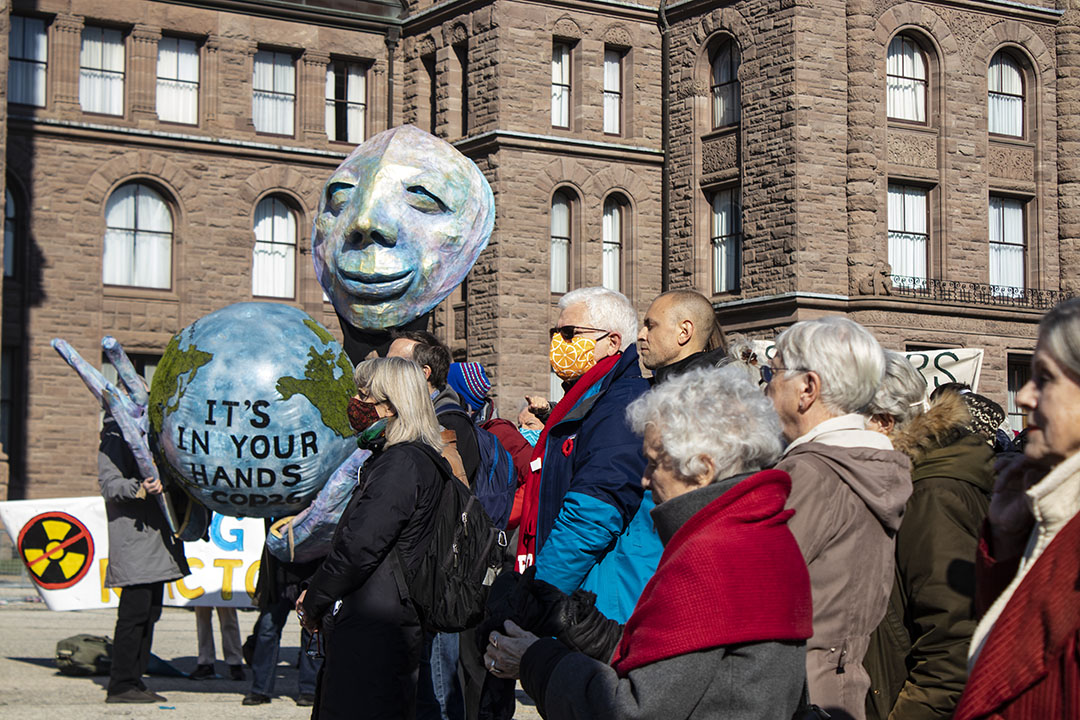As the 2021 United Nations (UN) Climate Change Conference of the Parties (COP26) was going on in Glasgow, hundreds of protesters came together at Queen’s Park in Toronto on November 6 to voice their concerns about inaction on the climate crisis.
The conference, which ran from October 31 to November 12, brought together world leaders with the goal of increasing action toward the Paris Agreement and the UN Framework Convention on Climate Change. Canada signed onto the zero-emission car accord,pledged to end deforestation by 2030, and pledged to stop subsidizing fossil fuel projects abroad by the end of 2022.
Meanwhile, protesters of all ages criticized the conference for its participants’ lack of action and accountability in implementing changes pledged at the conference.
COP26
Protesters said it was important to put pressure on world leaders during COP26 to demand that they commit to meaningful action.
Hannah Langelaan, a chemical engineering student attending the protest, added that her participation was a reminder that people “are showing up and… that [protesters] will continue to show up until there is change.”
Alice Zhu, a speaker at the protest and a PhD student studying plastic pollution and carbon cycling at UTSC, also spoke to the importance of protesting COP26. “With devastating consequences of climate change being felt all over the world, people are approaching COP26 with an urgency never felt before,” she said.
Zhu said that COP26 this year should be a turning point to stop reliance on fossil fuels and political inaction on climate change. Her speech included a list of demands to leaders at Glasgow, which included respecting Indigenous sovereignty, phasing out fossil fuels, supporting workers transitioning from high-carbon industry to renewables, and promoting climate justice globally.
“Every moment we continue to rely on fossil fuels, [we are] taking one step closer towards an unlivable planet, and losing out on reaping the huge benefits of investing in the clean energy industry,” said Zhu during her speech.
Sophie Bondi, a first-year U of T student, agreed with Zhu. “They promised to do something, but they never did it, and it has been happening for 30 years,” said Bondi. “The whole event is a sham, and I think most people are starting to realize that.”
When asked what she would like to see at the COP26 conference, second-year student Hannah Mesich said, “I’d love to see more mentions of climate change. That’s such a low bar, and I hate to say it.”
Mesich further said that zero emissions and making sure no more oil pipelines are built on Indigenous land were pledges she’d like to see at the conference, but she felt these were unlikely. Madeline Suzano, another second-year student at U of T, echoed Mesich’s statement and called for concrete action and accountability.
Lawson Gillespie, a PhD student in U of T’s Department of Physics, wanted to see more accountability measures put in place for countries that don’t meet emissions reduction targets. Gillespie also discussed the idea of climate debt, saying that developed countries have to be accountable for their disproportionate contributions to emissions.
Climate action at U of T
Students also talked about climate action at U of T. The university recently announced its intention to divest its endowment fund of fossil fuel investments by 2030.
Students noted that while divestment is an incredible achievement on the part of activists, there is still work to be done. Samina Hess, a second-year environment biology student, specified in an interview with The Varsity that the next step for activists was making sure that the university followed up on its promises.
Haruki Hirasawa, a fifth-year PhD student at U of T’s Department of Physics who is doing research on how different types of emissions affect rainfall in Africa, said that U of T is moving in the right direction and has always been a leader in climate research. But Hirasawa wants to see a stronger focus on environmental research at the university and more funding directed toward this kind of research.
Zhu, who worked on the divestment campaign, said she was very happy about the U of T’s decision to divest from fossil fuels after years of calls from activists. “The [fossil fuel] industry is coming to a close, and it’s the right decision,” said Zhu.
Climate action in Canada
Protesters focused on taking an intersectional approach to climate activism, and speakers demanded that politicians revise their plans for a smoother transition to a green economy to protect workers. In her speech, Andrea Babbington, the first Black woman to be president of the Toronto and York Region Labour Council, said these changes are necessary since, otherwise, families and communities could face job losses in the transition.
Students pointed out that Indigenous communities are most affected by climate change and that the climate crisis sheds light on many humanitarian issues. “I think it’s not realistic to think that we can address one of these issues without addressing all of the others,” said Hess.
For Gillespie, methane emissions in Canada are a big issue. Gillespie noted that not all methane emissions are taxed and pointed to taxing all methane emissions as a big goal for climate action in Canada.
“We have just elected a new government and now is the time to really pressure them,” said Zhu. “There is no time to waste. Canada must step up and lead the fight against climate change.” She noted that Canada has recently joined other countries at COP26 to stop directing finances to fossil fuels and would like to see its promise being kept.


